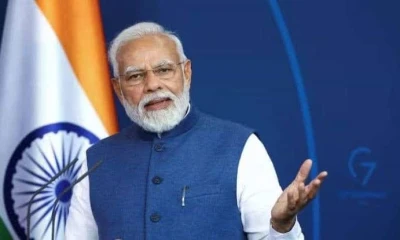Edited by Deepali Verma
Prime Minister Narendra Modi highlighted his government’s vision for reducing dependence on fossil-based fuels and highlighted the achievements that the country made under his administration in the energy domain on February 6.
“It is a matter of great pleasure that this event of India Energy Week is taking place in Goa which is always bustling with energy. Goa, known for its hospitality, has tourists coming in from all over the world who are impressed by the beauty and culture of this place. Goa is a state which is touching new spectrums of development, so today when we are together to talk about sensitivity towards the environment and sustainable future, then Goa is a perfect destination. All the foreign guests who would be attending this Summit will be taking lifetime memories of Goa with them” the Prime Minister said
During the inauguration of the second edition of India Energy Week 2024, PM Modi asserted that Bharat’s solar installed capacity has risen by nearly 20 times over the decade. The blending of ethanol has registered a rise from a mere 1.5 per cent to above 12 per cent.
Bharat has already rolled out 20 per cent blended fuel, but it has been done so in a phased manner, in April 2023 and widespread availability will be rolled out in days to come. By 2025, a full 20 per cent rollout is expected.
“Bharat has its focus set on building infrastructure at an unprecedented pace,” PM Modi said.
“Amidst the growing energy demand, Bharat is making sure that affordable energy is available in every corner of the country. Bharat is a country where despite many global factors, the prices of petrol and diesel have reduced in the previous two years. Beyond this, Bharat has been successful in achieving 100% electricity coverage. Electricity has been provided to crores of homes and with such efforts, today Bharat is progressing so much in the energy sector on the world stage. Bharat is constructing modern infrastructure of the 21st century and in this financial year we are investing an amount of Rs 10 lakh crore on infrastructure” the Prime Minister added.
Talking about Bharat’s energy demand, PM Modi has said that it will double to about 38 million barrels by 2045.
“Globally, experts believe that Bharat will soon become the third largest economy in the world and the energy sector is significant in this growth story of Bharat. It is already the third-largest energy, oil and LPG consumer in the world. We are the world’s fourth largest importer of LNG. We also enjoy the status of being the fourth largest refiner and automobile market. New records are being made in the sales of two-wheelers and four-wheelers in Bharat. The demand for EVs is also increasing and with that, it is estimated that Bharat’s primary energy demand will double by 2045” said the PM.
In conversation regarding the diversification of energy sources, the percentage of natural gas in the overall energy mix has registered a rise from 6 to 15 per cent. In the coming 5 to 6 years, PM Modi said that close to USD 67 billion investment will be made.
The government’s waste-to-wealth management programme has as many as 5,000 compressed biogas plants being worked upon, he said. Bharat, which is the world’s third-biggest oil importer and consumer, relies on crude oil from various sources in the global market to meet its domestic demand.
“Bharat’s carbon emission share is just 4 per cent globally yet we are improving our energy mix for a sustainable future. Bharat is emphasising on the overall development of environmentally conscious energy sources to enhance our energy mix. We have a goal to achieve Net Zero Emission by 2070,” he said.
PM Modi said that his government aims to provide rooftop solar to one crore families which will enable them to obtain up to 300 units of free electricity every month. The central government made announcements for the promotion of green growth and renewable energy while tabling the Interim Budget 2024-25.
PM Modi also touched upon his government’s Hydrogen Mission and said that Bharat will soon become a hub of hydrogen production and exports.
At COP26 held in 2021, Bharat made its commitment to an ambitious five-part “Panchamrit” pledge which included reaching 500 GW of non-fossil electricity capacity, generating half of all energy requirements from renewables while reducing emissions by 1 billion tonnes by 2030.
Bharat as a whole further aims to bring down the emissions intensity of GDP by 45 per cent. Finally, Bharat commits to net-zero emissions by 2070. Bharat, the world’s third-biggest oil importer and consumer, has dependency on the crude oil from various sources in the global market to meet its domestic demand.

















